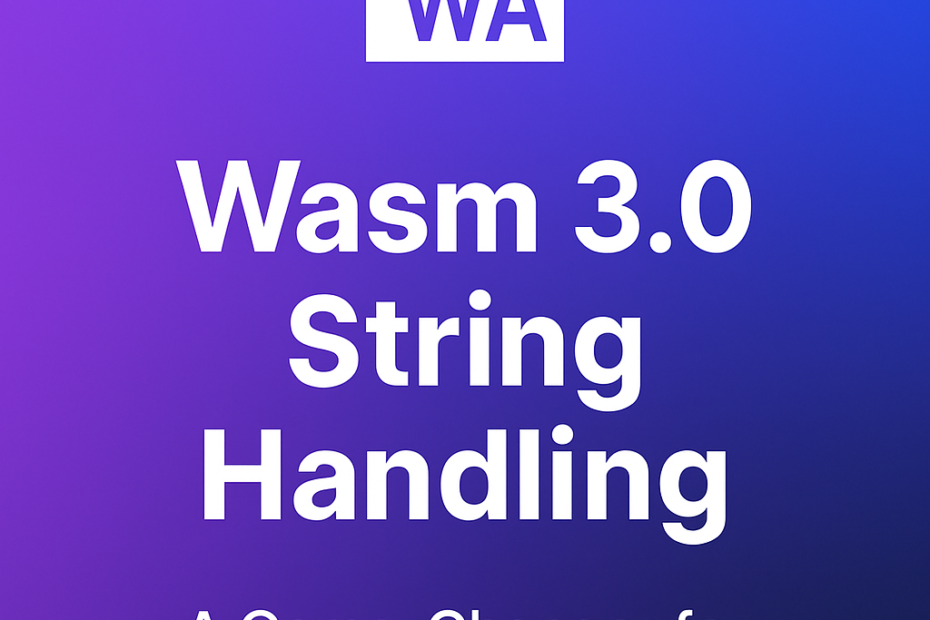WebAssembly is a low-level binary format that lets you run code written in languages like C, Rust, or Kotlin inside the browser, at near-native speed. It’s sandboxed, secure, and interoperable with JavaScript.
But until now, string handling was a pain.
🔥 The Big Problem: Strings in Wasm Before 3.0
Imagine you’re building a Vue.js app and want to offload some logic to Wasm—for example, a markdown parser or a translation engine. You pass a string from JS to Wasm… and suddenly:
- You need to encode the string into UTF-8.
- Allocate memory manually in Wasm.
- Copy the string byte-by-byte.
- Decode it again inside Wasm.
This is slow, error-prone, and hard to maintain. And if you’re compiling from a language like Kotlin or Dart, it gets even messier.
🚀 Wasm 3.0 Fixes This with Native String Support
Wasm 3.0 introduces first-class string handling, meaning:
✅ You can pass JavaScript strings directly into Wasm
No encoding, no memory juggling—just use them like native values.
✅ Wasm modules can call JavaScript string functions
Functions like string.length, string.concat, string.slice, etc., are now available as imported primitives.
✅ Strings are garbage-collected
Thanks to Wasm’s new GC support, strings are memory-safe and efficient.
🧪 How It Works: Under the Hood
Wasm 3.0 adds a new type: stringref. This is a reference to a JavaScript string, similar to how externref worked—but now with actual string semantics.
You can import string functions like this:
(import "js-string" "length" (func $strlen (param stringref) (result i32)))
(import "js-string" "concat" (func $concat (param stringref stringref) (result stringref)))And use them in your Wasm code like:
(call $strlen (local.get $myString))
(call $concat (local.get $str1) (local.get $str2))This is a huge win for compiler authors and framework developers.
🧩 Real-World Use Cases for Laravel/Vue.js Devs
1. AI-Powered Frontend Tools
If you’re building a Vue.js app that uses Wasm for AI inference or natural language processing, string handling is critical. Wasm 3.0 lets you pass prompts, responses, and tokens directly—no encoding needed.
2. Markdown or Rich Text Parsing
Offload parsing logic to Wasm for performance. With native strings, you can pass entire documents in and get structured output back.
3. Localization Engines
Translate strings in real-time using Wasm modules compiled from Java or Dart. No more memory hacks—just clean string APIs.
4. Compiling Kotlin/Dart/Java to Wasm
These languages rely heavily on string manipulation. Wasm 3.0 makes them viable targets for browser-based apps.
🛠️ How to Start Using It
- Use a Wasm toolchain that supports GC and stringref (e.g., Binaryen, WasmGC).
- Import JS string functions into your Wasm module.
- Compile your high-level language (Rust, Kotlin, Dart) with stringref support.
- Use
WebAssembly.instantiateorWebAssembly.compileStreamingwith the new imports.
🧠 Final Thoughts
Wasm 3.0 string handling isn’t just a technical upgrade—it’s a developer experience revolution. It removes one of the biggest pain points in Wasm-JS interop and opens the door for richer, faster, and more maintainable web apps.
If you’re building tools, compilers, or AI-powered interfaces, this is your moment to go deeper with Wasm.
Fuel my creative spark with a virtual coffee! Your support keeps the ideas percolating—grab me a cup at Buy Me a Coffee and let’s keep the magic brewing!
